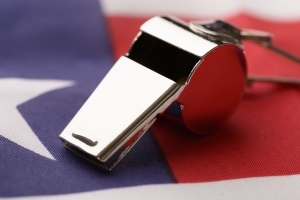Can the Government Direct a Whistleblower to Secretly Record Conversations with a Fraudster Represented by an Attorney?
March 3rd, 2020
 The public-private partnership envisioned by the qui tam provisions of the False Claims Act (FCA) is one of its most successful and powerful aspects, yielding billions of dollars in recoveries. The FCA permits the Government, the whistleblower, and their attorneys to cooperate—and they often do—when investigating and litigating FCA claims. But are there limits to that cooperation? Can government officials ask a whistleblower to secretly record conversations between the whistleblower and individuals who are under investigation but are represented by an attorney? The answer, according to one federal court, is “yes.”
The public-private partnership envisioned by the qui tam provisions of the False Claims Act (FCA) is one of its most successful and powerful aspects, yielding billions of dollars in recoveries. The FCA permits the Government, the whistleblower, and their attorneys to cooperate—and they often do—when investigating and litigating FCA claims. But are there limits to that cooperation? Can government officials ask a whistleblower to secretly record conversations between the whistleblower and individuals who are under investigation but are represented by an attorney? The answer, according to one federal court, is “yes.”
On March 2, 2020, the United States District Court for the District of Minnesota published an important order clarifying this varied and complex area of the law. See U.S. ex rel. Fesenmaier v. The Cameron-Ehlen Grp., Inc., — F. Supp. 3d —-, No. 13-CV-3003 (WMW/DTS), 2020 WL 986577 (D. Minn. Mar. 2, 2020). In Fesenmaier, FBI agents directed the whistleblower, a former employee of the defendant company under investigation for offering kickbacks to doctors, to secretly record conversations with company personnel as part of the government’s criminal and civil investigations. Both before and after he filed his False Claims Act complaint, the whistleblower surreptitiously recorded several of his conversations with various company officials, including the founder and majority owner of the company.
The company challenged the propriety of the recordings, pointing to laws governing the professional conduct of attorneys. Of particular concern to the company was the fact that some of the recordings were made after the company had not only retained counsel but had notified the government of such legal representation. The company argued that the whistleblower’s attorneys and the government’s attorneys violated ethical rules governing contacts with represented parties and, as a result, the case should be dismissed, counsel should be disqualified, and/or the recordings should be excluded from evidence. The Court disagreed.
The Court determined that the whistleblower, his attorneys, and the government attorneys involved did not violate the law in orchestrating and obtaining the recordings. More specifically, the Court concluded that because the recordings were made before the government filed its complaint against the company, those recordings were “authorized by law”—an exception to the rule that usually prohibits an attorney from contacting a party she knows to be represented by another attorney. As the Court explained, relying on United States v. Plumley, 207 F.3d 1086, 1095 (8th Cir. 2000):
It is well-established that the authorized-by-law exception to Rule 4.2 applies to the government’s pre-indictment investigative activities. And in the qui tam context, the closest analogy to the government’s decision to seek an indictment is the government’s decision to intervene. . . . [Thus,] the pre-indictment and pre-intervention investigative activities conducted by the United States, in this case, were authorized by law and, therefore, did not violate MRPC Rule 4.2.
Fesenmaier, 2020 WL 986577 (citation omitted).
One aspect not discussed in the case related to recordings—consent. Many states only require that one party who is a part of the conversation consent to the recording, which includes the party making the recording. Minnesota is one of those one-party states. However, at least California, Connecticut, Florida, Illinois, Maryland, Massachusetts, Montana, New Hampshire and Washington, require the consent of every person who is a part of the conversation. Whistleblowers should check on the current status of consent laws before secretly recording any conversation.
A key takeaway from this case is that cooperating effectively with government attorneys and agents in FCA/qui tam cases cannot be overstated. It requires qualified attorneys who have in-depth legal knowledge, expertise in analyzing factually complex situations, deep investigative and litigation experience with the FCA, and the confidence and trust of the government officials investigating the qui tam allegations. Halunen Law’s False Claims Act Group provides this and more. If you are aware of fraud against the government, contact Halunen Law’s False Claims Act Group for guidance and assistance.

